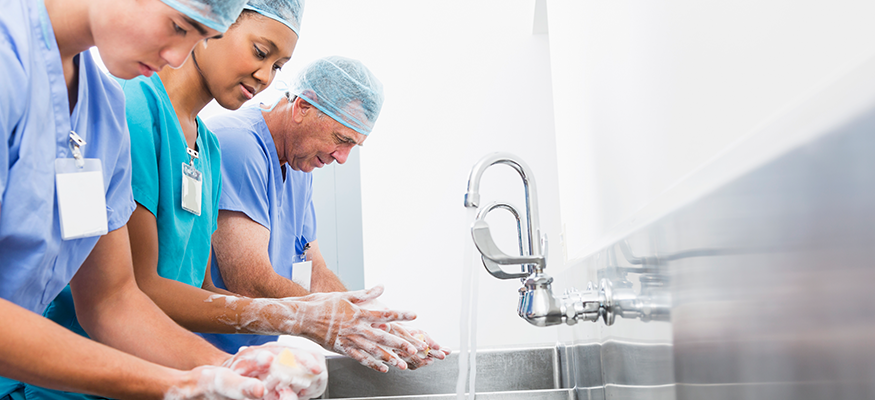
Guide to Hand Washing
- Wet your hands with warm water. Apply soap and scrub for at least 20 seconds. Wash the front and back and wrists, between fingers and under nails.
- Rinse well. Let the water run down your fingers not down your arms.
- Dry your hands with a paper towel.
- Use your elbows or a new paper towel to turn off faucets.
- If using the alcohol hand sanitizer use about the size of a cotton ball in your hand. Cover all parts of your hands and continue to rub until your hands are dry.
Preventing Falls
Many medications, treatments and medical procedures can affect your balance and behavior. To help reduce the risk of a fall while in the hospital, be sure to follow the tips below.
Steps to Reduce Your Risk of Fall
- Follow your nurse's advice about getting out of bed by yourself
- Use the call button for help getting out of bed if you have:
- IV fluids, a catheter or other tubes
- Received medication that makes you drowsy or sleepy
- Received pain medication or a sedative
- Use the bathroom call light to be escorted back to bed
- Call the nurse if you feel sick, light-headed or dizzy
- Wear non-skid slippers
- Alert us to any spills on your floor
Tips on Antibiotics
Antibiotics are drugs used to treat infections caused by bacteria. Sometimes these drugs will no longer kill the germs. This is called antibiotic drug resistance. These so-called multidrug-resistant organisms (MDRO) are usually spread by contact with people who are infected.
Prolonged or repeated hospital stays, the use of IV's, catheters, surgical and other medical procedures and treatment involving the use of large quantities of antibiotics pose increase risk of infection.
Chesapeake Regional has a set of stringent safeguards and procedures in place to protect our patients from exposure to multidrug-resistant organisms, yet it is important that every patient understands the risks of exposure and how to prevent it. However, it is important that every patient understands the risks and how to prevent exposure.
If you do become infected with multidrug-resistant organisms, your health care workers, family and friends must wear gloves and gowns, and wash their hands with soap and water or use alcohol cleanser before and after contact with you. Proper hand washing with soap and water or the use of alcohol-based sanitizers is the best way to prevent the spread of germs. If you have additional questions or concerns, please don't hesitate to ask your nurse.
After Discharge
Not all of the precautions taken in the hospital are necessary at home. It is advisable for everyone to follow these basic hygiene guides:
- Keep wounds and sores covered with clean, dry bandages. Soiled dressing should be placed in a plastic bag and placed in the regular trash.
- Caregivers should wash their hands with soap and water before and after assisting in your care.
- You should wash your hands thoroughly and frequently throughout the day.
- Towels/washcloths should be laundered frequently using as hot a wash cycle as is compatible with the fabric.
- Bed linen should also be changed regularly and laundered as above.
- Do not share personal items such as towels, washcloths and razors.
- Avoid skin-to-skin contact until any sores are healed.
- Tell your health care provider if you have had an infection or colonization in the past.
Signs of Infection
Contact your health care provider immediately if you experience any of the following:
- Drainage from a wound
- Fever
- Chills
- Burning on urination
- Very severe cough with sputum
The Rapid Response Team
If you have a medical emergency, ask the nurse to call the Rapid Response Team (RRT). Chesapeake Regional Medical Center's Rapid Response Team is ready around the clock to respond to patient emergencies. The team is made up of respiratory therapists, intensive care and emergency room nurses. They are all specially trained to recognize and reduce the risk of heart attack, stroke, respiratory distress, and other medical emergencies.
Preventing DVT Blood Clots
Deep Vein Thrombosis (DVT) is caused when a blood clot forms in a deep vein of the body. The deep veins in the legs, thighs, and hips are the most common sites for DVT. Having a major surgery or injury may lead to this condition. You may also be at risk if you have an infection, cancer, obesity or heart failure.
Preventing DVT After Surgery
- Inform your surgeon of any medical conditions or history of DVT
- Quit smoking
- Ensure you walk and move your legs right after having surgery
- Avoid long periods without activity
- Move legs frequently while in bed if you are unable to walk.